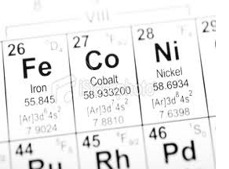Cobalt (Co)
 In ruminant animals, cobalt is an essential nutrient needed on a daily basis. Forage containing this element is eaten and the essential Vitamin B12 (cyanocobalamin) is synthesised in the rumen through the action of bacteria. Without adequate B12, ruminants suffer a wasting disease that is fatal unless a cobalt source can be found. Sheep are more prone to B12 deficiency than cattle, but both need cobalt in their diet. A more recent discovery shows that adequate dietary cobalt also improves fibre digestion. In humans, B12 deficiency leads to anaemia and damage to the brain and nervous system; in ruminants immune deficiency, emaciation, weakness, weeping eyes and infertility.
In ruminant animals, cobalt is an essential nutrient needed on a daily basis. Forage containing this element is eaten and the essential Vitamin B12 (cyanocobalamin) is synthesised in the rumen through the action of bacteria. Without adequate B12, ruminants suffer a wasting disease that is fatal unless a cobalt source can be found. Sheep are more prone to B12 deficiency than cattle, but both need cobalt in their diet. A more recent discovery shows that adequate dietary cobalt also improves fibre digestion. In humans, B12 deficiency leads to anaemia and damage to the brain and nervous system; in ruminants immune deficiency, emaciation, weakness, weeping eyes and infertility.
Vitamin B12 is also needed for the production of red blood cells. Monogastric animals, such as humans, pigs, dogs and rats, do not possess the bacteria required for B12 production. Instead of cobalt in its basic compounds, they need ready-made B12 in the form of meat, as plants, vegetables and fruit contain none. For this reason, vegetarians and vegans need supplements. Non-human monogastrics will often resort to eating ruminant faeces for their B12 supplies.
Cobalt Deficiency Symptoms in Livestock
Poor growth and uncoordinated hind legs in young pigs
Scabby ears in sheep
Scouring of lambs in first month
Frequent worming
Casting Ewes
Yellow matting on saddle at shearing
Poor thrift and condition
High forage consumption
‘Pine’
Weeping eyes
Poor fertility
